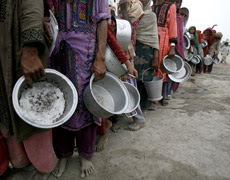 |
| Food Aid Pakistan -Athar Hussain/Reuters |
Toni Johnson
Council on Foreign Relations
The world experienced a major food crisis in 2008 that led to civil and political unrest from Bangladesh to Haiti and added millions more to those suffering from malnutrition. Though prices have dropped somewhat, some analysts say the crisis never totally ended. With prices rising dramatically in 2010, the world could be on the brink of a new crisis.
While food prices remain below their 2008 highs, “they’re a lot higher than they were before ‘the food crisis of 2008’ took hold,” says financial journalist Addison Wiggin (Forbes), noting that wheat, corn, and sugar prices are up more than 50 percent since the beginning of the year. Farm commodity expert Don Coxe argues the first major crop failure in 2011 is all that’s needed to “have a full-blown food crisis,” one potentially worse than 2008.
In a November report last week, the UN’s Food and Agriculture Organization (FAO) sounded the alarm over skyrocketing food prices, predicting the world’s food import bill (PDF) could be more than $1 trillion in 2010. The FAO says that food stocks are high enough to avert a new crisis but that predictions that cereal yields in chief producing countries will decrease in the coming year are driving prices up much faster than they rose in 2008.
The report notes countries such as Pakistan, devastated by flooding this summer, and many least-developed countries are expected to feel rising food prices the most; it argues more should be done to understand the implications of commodity market speculation on food prices. “A key lesson of 2008 is that volatile global financial markets can result in food commodity price speculation that has dire consequences for the world’s poorest,” notes CFR’s Laurie Garrett. But others say that it was export restrictions, panic buying, and hoarding (JakartaPost) that precipitated the 2008 crisis.
Some countries are already beginning to respond. Russia announced in October it would continue its ban on grain exports for another eight months, a measure put in place in August following the severe drought and wildfires that decimated crops in the country this summer. China, experiencing the worst food inflation since 2008 (SydneyMorningHerald), announced last week it would cap prices on grains, edible oil, and sugar. And the EU is contributing 40 million euros to stabilize Pakistan’s food prices.
As global food demand increases, experts say more should be done to bolster agriculture production in least- developed countries and reduce agriculture trade barriers. “Looking beyond the immediate crisis, the United States and other developed countries must renew long-neglected investments in agriculture.



Be the first to comment on "New Food Crisis Looms"